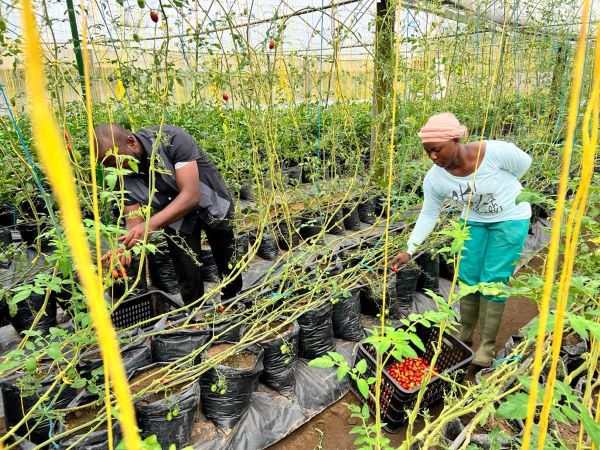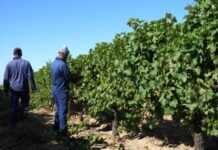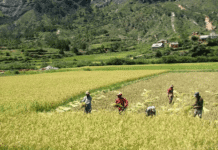By Amindeh Blaise Atabong
Since last year, prices of basic food stuffs have been soaring across local markets in Cameroon, caused in part by the disruption of global supply chains following the Russian invasion of Ukraine.
The unprecedented price hikes is leaving the fate of many in the central African nation, especially low-incomes earners, on the balance. Many now struggle to afford a square meal a day.
Tessang Marie, a middle-aged woman, is among those affected by the dramatic turn of events. Marie is one of the thousands of small-scale traders, popularly known as ‘Buyam-Sellam’, in the economic capital Douala. She now barely ekes out a living.
“Business is not moving because everything is expensive,” she told Farmers Review Africa at Marché du Rail, a small market in Bonaberi – Douala. “One litre of palm oil sells at 1,000 CFA francs. One litre of vegetable oil sells at 1,700 CFA francs – 1,800 CFA francs. Things are not fine. Thing are bad in the country. Even things like the vegetables which I am selling are also expensive because of high transport cost,” Marie bemoaned as other nearby petit traders in unison decried the rising cost of living. Before the war in Ukraine, a litre of vegetable oil will sell at most 1,300 CFA francs.
“Even if you used to be given 2,000 CFA francs [by your husband] for two days, now with that money you can only use it to buy one litre of palm oil. What do you do with the remaining 1,000 CFA francs! We will die of jellof rice every day,” Marie said as she complained she is no longer able to feed her family of five nowadays.
The unavailability of certain food items all year round, experts say, is also responsible for the price fluctuations. One technology entrepreneur who has committed to stabilise food prices by making them available throughout the year in Cameroon is 41-year-old Roland Fomumdam, who returned home from the US aged 25 with a background in entrepreneurship, after trying his hands in pharmacy.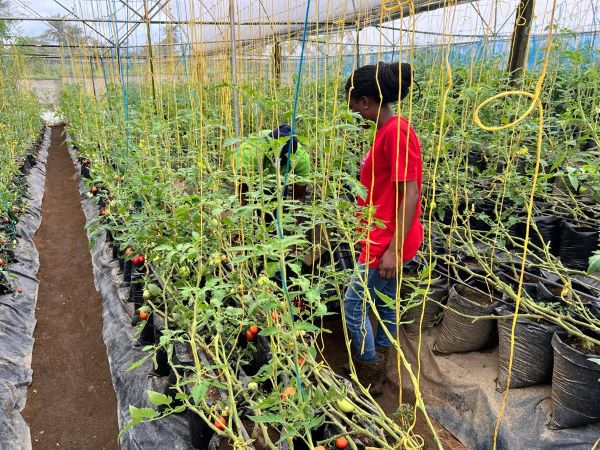
Fomumdam chose to return to his homeland Cameroon because he wanted to exercise his entrepreneurial abilities in a challenging environment, and his country possessed all such characteristics.
Addressing food price fluctuations
On arrival, he realised the agricultural industry was one which was so ignored; one which many were not paying attention to; one which he believed had a lot of opportunities especially if those opportunities were being capitalized on. The entrepreneur was also keen on solving one big problem – price fluctuations.
“It is a very difficult problem to be able to resolve. And that price fluctuation is simply because of the availability of several produce on the market during different seasons. So, we needed to find a way where we can produce same types of crops in the same amount year round irrespective of what season we have out there,” Fomumdam said.
Fomumdam’s burning desire to solve the seemingly intractable problem pushed him to introduce the first low-cost climate-smart greenhouse farm in Cameroon in 2013 to be able to produce a constant quantity irrespective of the season of the year. He would later register his initiative as Greenhouse Venture Cameroon, and also open Greenhouse Academy to train precision agriculture enthusiasts.
“Initially, when we came in, we were a technology company and our focus was introducing sustainable technology in the rural areas. But along the way we realized that, to those people whom we considered as costumers, they could not avoid our technology and the majority of them were farmers. So, we needed to find a technology that of course will be able to increase production and a business model that will be able to ensure profitability. And that is how Greenhouse Ventures Cameroon was born,” he disclosed.
Greenhouse technology in Cameroon is not entirely new. Around 1995, the government introduced the technology through the Agricultural Research Institute for Development (IRAD) by importing ready-made greenhouses into the country. But inefficient follow-up and lack of proper management foiled its implementation.
Thanks to Fomumdam who pioneered the construction of greenhouses locally at low cost, the technological innovation is fast gaining adoption across the national territory. While a greenhouse is generally a wooden or metallic room-like structure covered with transparent material such as glass or plastic, those designed and built by Fomumdam’s Greenhouse Ventures are customised to one of the five ecological zones of Cameroon.
With the greenhouse, Fomumdam is able to sell his produce at the same price from January to December. He is also able to offset importation of food items such as bell pepper and cherry tomato. “If you go to supermarkets today, you will find our bell peppers. Bell peppers never used to be sold, especially locally-grown bell peppers. We have been able to substitute importation of bell peppers by over 90%, which I believe is a great remark for us,” he said, adding that his farms produce the largest quantity of strawberries and cherry tomatoes in the country.
Fomumdam is not hot about total substitution because he believes competition breeds innovation and development. “We believe that we can actually show that what can be imported or produce abroad can be done here too, and even better. Today, when imported products can only last about six days on the shelves, ours can go up to 14 days,” he said. The entrepreneur boasts Greenhouse Ventures is producing at a higher value and higher quality than what is normally being imported. “What is also very peculiar is the fact that we can compete now with imported products. It actually increases the value and the price point. And that is one way that we are able to upgrade the benchmark of what agriculture has always been.”
In one of Fomundam’s farms in Bangue, some 35km northwest of Douala, it is harvesting day. Harvesting takes place here every Wednesday in a 720m² greenhouse. The greenhouse is located as the entrance of a 13-heactare integrated farm where table birds, pigs and plantain are also grown.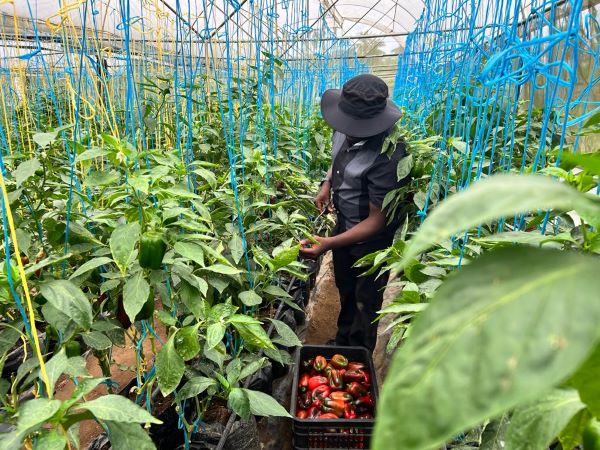
Bounty harvest, knowledge transfer
As the morning dew give way to the rising sun, Fomumdam and his team enter the greenhouse which temperature ranges 35°C-37°C. They trample their legs in a dish of water at the entrance to disinfect and spread out on the greenhouse to begin the day’s harvest.
After about three hours of harvest, Tegum Sonita Indah, Farm Manager of Greenhouse Ventures Cameroon at Bangue, tells Farmers Review Africa they were able to get 160kg of bell peppers, 47kg of tomatoes and 28kg of cherry tomatoes. On hand was a supplier ready to deliver the fruits to the market.
“We were not expecting this type of big harvest today. We are surprised,” the 30-year-old farm manager said.
The greenhouse harbours 3,000 plants. While bell pepper has a life span of six months, it can be harvested every week. One kilogram is sold at 3,000 CFA francs at the farm gate compared to 8,000 CFA francs for imported bell pepper.
Besides harvesting, Indah, who studied forestry before switching to agriculture, carries out other activities such as weeding, cleaning the grow bag and irrigation.
“I am loving my stay here. When I see the plants growing, the way they are fruiting, it gives me that motivation to go on,” Indah, who has put in six months at Greenhouse Ventures, said.
Bangue is just one farm out of Greenhouse Ventures Cameroon’s portfolio of eight farms including those in Bakingili, Bafang, Bangoa, Yaounde, Dibamba, Bali, and Dibombari. Greenhouse Ventures has moved on from being able to produce only about 100kg every week to about 500kg every week of a particular produce, according to Fomumdam, and the company aims to collectively hit 1 million tons per year by 2024.
Fomumdam is also planning to expand the production of wheat, having tried its production in some farms in the northern part of the country. This he says is to respond to the scarcity and hike in price of wheat flour following the war in Ukraine. “We actually follow the market. Whatever the market requires, whatever the demand is, we actually go in to produce it,” he said.
Though Fomumdam’s greenhouse initiative has yet to receive financial support from the government, it has however gotten government’s endorsements. Fomumdam has built greenhouses for the ministry of secondary education – introducing greenhouses in secondary schools.
Besides building greenhouses for other farmers and organisations, Fomumdam has been engaged in knowledge transfer through the Greenhouse Academy.
Godwill Angereh is one of the students who have been undergoing training in the academy. The fourth child in a family of five moved over 250km from Yaounde to Bangue to gain knowledge of the technology.
“What motivated me to enrol into Greenhouse Academy was the fact that I grew up in farming, a rural environment. Farming was all I was in contact with. I went to the university but due to the difficulties in getting a job and looking at the opportunities which farming presents, I began to develop interest in agriculture,” he said. Angereh plans to start his own greenhouse farm when he must have completed the training and mobilised funds.
Fomumdam believes greenhouse technology still holds much promise for the future of agriculture in Cameroon. But for now, he says “the difficulty is just being able to meet up with the production expectation we do have on the market today.”


